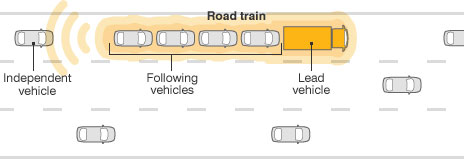Autonomous Platoons: Brought to you by Over-Engineered Solutions
I was reading my news this morning when I stumbled across a new study funded by the European Union that got a little under my skin. (http://www.botjunkie.com/2009/11/12/truck-and-car-platoons-could-allow-for-autonomous-driving/).
The problem?
Drivers are lazy and can cause accidents.
Their solution? *European Union
Adaptive cruise-control vehicles that follow a lead vehicle on the highway. The lead vehicle is driven by a professional and the rest of the cars follow the leader while their drivers "take their hands off the wheel, read a book or watch TV."

There are a few problems with this. Overlooking the fact that trains have existed for decades, so this isn't truly a new concept, there are serious control issues that need to be addressed.
Follow the who?
How do you decide which vehicle is the lead? "Okay, so Bob is in front, and he's a truck, so I'll follow him. WOW! Bob is a terrible driver!" But I don't notice, because I'm sitting back, reading the morning newspaper.
Sure, you could have some smart software that decides Bob isn't going to get you to your destination safely, but if you're already going to have all that processing, why not just have full autonomy?
Make a left turn now!!
"Where am I?" Turns out Bob decided to take Exit 5, a few miles ahead of my actual destination. Since I wasn't really in control of my car, I lost time and fuel.
Perhaps there is some solution like pre-programming your route into GPS and letting the software take care of following its own path. But still, there's no guarantee that the driver hasn't fallen asleep when you need him to take back manual control.
Questionable Efficiency
The article cites a 20-40% efficiency gains from vehicles following closely, much like geese flying in a vee. What it fails to acknowlege is the fact that every member of this "platoon" has its own locomotion system. That efficiency calculation will probably tank when compared to a conventional train. There's also problems with wear and tear on each engine versus only needing to service a one or two engines, as in a train.
Conclusion to the Saga
There are definitely some interesting challenges to solve here, so I agree the study is worthwhile. It just seems like the focus is wrong -- a solution searching for a problem. And a problem that already has a better solution.
Mass transit isn't everywhere, and trains only work well on special tracks. The ability to travel in a train configuration while still retaining independent destination control is appealing. Our road systems and vehicle technology, however, do not have the necessary infrastructure to safely allow drivers to tune out while rolling down the highway at 60mph.
We've seen some great results from the recent DARPA Urban Challenge that alludes to the possible future of fully autonomous vehicles. I don't see a hybrid solution (people + robot) working out any time soon.
UPDATE: The NavLab at Carnegie Mellon did demonstrations of this technology back in the 80's.
Labels: autonomous, botjunkie, cars, DARPA, driving, news, opinion, vehicles
 Subscribe to DanShope.com
Subscribe to DanShope.com